‘Reimagining Access’ for Incarcerated Students
January 2020 – Lake Tahoe Community College
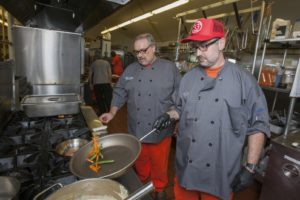 “Just sitting around doing nothing” is how Wesley spent his first stint behind bars. He believes it’s also what kept him coming back.
“Just sitting around doing nothing” is how Wesley spent his first stint behind bars. He believes it’s also what kept him coming back.
“I’ve been in and out of prison a lot, and I had no real experience in the work field,” says the Growlersburg Conservation Camp #33 inmate, one of four pilot students in Lake Tahoe Community College’s inaugural Culinary Boot Camp for incarcerated students. “Now, I’m grateful to have something to go with.”
Wesley’s story is a common one in California, where more than 65 percent of those released from prison return within three years, according to a 2012 report by the California Department of Corrections and Rehabilitation.1 That’s one of the highest rates in the nation, but California is fighting back, with bold higher education solutions like those being pioneered by LTCC. According to a 2018 Rand study, programs like these have been shown to reduce recidivism by a staggering 28 percent.2
In just five days, Wesley learned the foundational skills for a career in the culinary industry, everything from time management to avoiding cross-contamination. Wesley is close to his release date, and he aspires to work in a hospital cafeteria “behind the scenes” doing prep work.
“I’m confident in what I’ve learned. You can go up to a restaurant a couple of days out and ask for a job,” says Wesley. “You have an income, and you can feel good about yourself.”
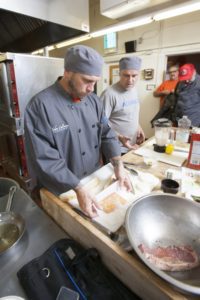 The Culinary Boot Camp is the latest offering from LTCC’s Incarcerated Student Program (ISP), which seeks to instill an “outside-of-bars mindset” while preparing inmates for in-demand careers. Program Director Shane Reynolds believes that community colleges can play a key role in creating new opportunities for students like Wesley, who are looking for a fresh start.
The Culinary Boot Camp is the latest offering from LTCC’s Incarcerated Student Program (ISP), which seeks to instill an “outside-of-bars mindset” while preparing inmates for in-demand careers. Program Director Shane Reynolds believes that community colleges can play a key role in creating new opportunities for students like Wesley, who are looking for a fresh start.
“As colleges, we need to reimagine access,” says Reynolds. “We need to find new ways of serving this student population, and this culinary certificate is just one of those ways of providing access and eliminating multiple barriers.”
“This is a really accessible employment path for immediately released folks,” adds Josh Sweigert, Regional Director of Employer Engagement for Retail, Hospitality and Tourism for the North Far North Regional Consortium. “The kitchen work is there, and they are hiring in every community across California.”
Not only does the program give incarcerated students job skills, “it also gives them a sense of positivity,” says Reynolds, who attributes that hope to a sense of momentum and confidence earned by persisting in college courses.
LTCC’s ISP program started about five years ago, offering students an associate degree for transfer in Sociology. Since then, the College boasts an astounding 71 percent course success rate for incarcerated students, with graduates going on to thrive as contributing members of their communities. Among the students from the first cohort is Erin Boetzer, who maintained a 4.0 grade point average and is currently continuing her straight-A streak at Cal State University, Monterey Bay [https://www.tahoedailytribune.com/news/ltcc-program-helps-incarcerated-students-succeed/].
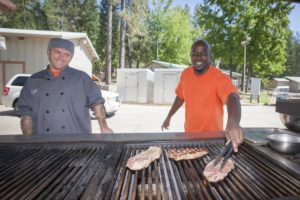 “We’re starting to get more people calling us up saying, ‘Hey … I’m doing well. I have a job, and thank you,’” says Reynolds.
“We’re starting to get more people calling us up saying, ‘Hey … I’m doing well. I have a job, and thank you,’” says Reynolds.
And with growing options in the incarcerated student culinary program, more students than ever are learning the skills to enter stable, rewarding careers. Demand for food preparation and serving-related occupations is soaring by 11 percent annually – much faster than the national average — with an anticipated 1.5 million new jobs expected in the field by 2028.3 In other words: there has never been a hotter time to be in the kitchen.
The Culinary Boot Camp started with Advance, Lake Tahoe’s adult education and career network. Advance designed the program, operating it for two years before it eventually was adopted as a non-credit college course through LTCC. “They set out to create work-based, skills-focused boot camps to get people involved with the local industry and have local hiring paths,” according to Sweigert.
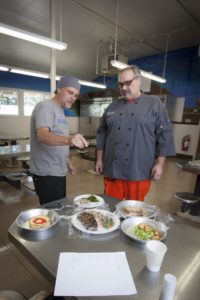 With assistance from the College, Advance took an introductory culinary class, condensed it to 40 hours, and collaborated with local chefs and restaurant owners to adapt the curriculum to serve real workforce needs. Finally, Strong Workforce Program funding helped make the Culinary Boot Camp a reality for the Incarcerated Student Program.
With assistance from the College, Advance took an introductory culinary class, condensed it to 40 hours, and collaborated with local chefs and restaurant owners to adapt the curriculum to serve real workforce needs. Finally, Strong Workforce Program funding helped make the Culinary Boot Camp a reality for the Incarcerated Student Program.
“That was the perfect model to teach in the prison system because it was quick, condensed, and designed to be taught over one or two weeks,” explains Sweigert. “It was a no-brainer to bring culinary into the Incarcerated Student Program.”
The pilot program was conducted at Growlersburg Conservation Camp #33, with four students receiving individualized instruction. The Boot Camp also incorporated a ServSafe® Food Handler Certificate, which Sweigert says “prepares anybody for entry-level employment in the kitchen.” According to the Regional Director, three of the four pilot students were already working toward their associate degrees through LTCC, and the fourth is now looking to register, as well.
To increase access, the Boot Camp is supported through braided funding, with regional Retail, Hospitality and Tourism dollars covering the ingredients and instructor hours, and California Promise Grant funds supporting tuition and enrollment fees.
“The goal was to make sure that anybody who wanted to commit to a workforce training program wouldn’t have any cost attached,” says Sweigert.
Growlersburg was an ideal location for the pilot, due to the facility’s Statewide deployment of mobile kitchens to support CAL FIRE crews. These kitchens serve up tens of thousands of meals for hungry firefighters during fire season, and for Sweigert, represent an opportunity for synergy.
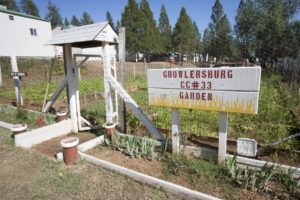 “There’s a pretty strong culinary culture already at that facility,” he says. “That made for a good fit.”
“There’s a pretty strong culinary culture already at that facility,” he says. “That made for a good fit.”
With the success of the pilot program, LTCC and Growlersburg are in talks to develop more Boot Camps in 2020. Ideally, according to Sweigert, all incarcerated culinary staff working in the mobile kitchens for CAL FIRE would have a chance to complete the course in time for the next fire season. The College is also looking to replicate and scale up the program at other locations.
“I think one of the biggest next steps would be looking at moving this into a more complicated facility,” says Sweigert, who hopes to expand the idea to the broader region and possibly the state. Next steps also include developing an employable skills certificate and certificate of achievement.
Also under development is an employer education package, including testimonials and a breakdown of tax benefits, to incentivize hiring program graduates.
 For program grads like Damien, employment means more than just a regular paycheck. It means finding a rhythm within society and reinventing their lives.
For program grads like Damien, employment means more than just a regular paycheck. It means finding a rhythm within society and reinventing their lives.
“I learned a lot more than I knew about cooking,” says the LTCC Culinary Boot Camp graduate. “I just appreciate Lake Tahoe … for creating this.
“It gives us another opportunity to be successful when we get out.”
And while gainful employment is the immediate goal, Reynolds is especially proud of Lake Tahoe Community College’s ongoing commitment to supporting students like Damien beyond graduation.
“They will always be Lake Tahoe Community College Coyotes,” says the Director.
Sources:
https://californiainnocenceproject.org/issues-we-face/recidivism-rates/
https://www.tahoedailytribune.com/news/ltcc-program-helps-incarcerated-students-succeed/
https://www.bls.gov/ooh/food-preparation-and-serving/home.htm